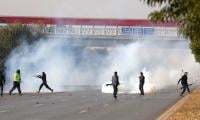KARACHI: Accountability court judge Nasim Akhtar has rejected the bail pleas of Jamshoro Joint Venture Limited (JJVL) owner Iqbal Z Ahmed, his two sons Fasihuddin and Raziuddin and three other accused Humayun Farid, Asim Iftikhar and Salamat Ali in a corruption case.
The counsel for Ahmed and his sons claimed that the court did not hear them before passing down the decision, which was against the principles of justice.
The National Accountability Bureau (NAB) had filed a reference in 2020, alleging that the accused persons during the period from October 20, 2011 to August 20, 2019 declared the sales of JJVL as Rs72 billion with the intention of covering up injection of black money into corporate bank accounts of the JJVL.
According to NAB, sole business of the JJVL was based on LPG and NGL that were supplied to them by the Sui Southern Gas Company Limited (SSGCL).
It said that evidence collected from the SSGCL revealed that it supplied LGP worth Rs22.88bn to the JJVL, but contrary to that the JJVL declared its sales up to Rs43.43bn, which was 200 percent more than the actual sales. However, the record of sales tax return submitted by the JJVL to Federal Board of Revenue mentioned that the total sale of Rs25bn. It transpired during investigation that the JJVL supplied 347,625 metric tonnes out of 614,285 metric tonnes of LPG to its five companies, which was 57pc of the total LPG sale declared to Oil and Gas Regulatory Authority (OGRA) and the value this sale was Rs21.79bn.
The NAB said that the accused persons in connivance of each other and through corrupt practices were found guilty of Rs28bn money laundering.
The defence counsel argued that the NAB allegations are contrary to the facts. He said that the NAB did not provide the details of JJVL’s income from other sources, such as gas production and exports, in the reference with malafide intentions. He added that the NAB only included the income derived from gas processing and trading with SSGCL. He contended that the NAB falsely accused his clients of money laundering.
He asserted that the Sindh High Court in 2020 had granted bail to his clients taking into consideration the facts presented by him. He said that the high court had observed in its order that the NAB did not present any evidence against their claim of corruption and money laundering against the accused.
The defence counsel said that after the amendments in the NAB law, the reference against the accused was withdrawn. He added that the SHC while returning the reference had remarked that the NAB had accepted that no evidence for money laundering and corruption were found against the accused, nor these allegations fell within the ambit of NAB Ordinance’s sections 9 (a) (ix, x and xi). The high court added that NAB also accepted that JJVL did not use public funds and cause loss the national exchequer, and the accused were private persons and not government officials.
Following the withdrawal of reference, the court had returned the sureties submitted by the accused. However, after the Supreme Court’s decision against the NAB law amendments, the reference has been restored. But the trial of Ahmed and other accused has not resumed, because the SC decision does not cover individuals. After the SC decision, the accused persons moved their pre-arrest bail applications in the SHC which were rejected, and they were taken into custody by the NAB on November 11.
According to the defence counsel, the accountability court rejected his clients’ bail pleas on technical grounds, without considering the case merits and SHC order. He added that the court could have granted bail over surety bonds, however the decision to cancel the bail was against the principles of justice.
It is pertinent to mention that the applicants have already approached the SHC against the accountability judge’s order.
Targeting security forces dedicated to maintaining law and order is outright act of terrorism, says Bilawal
EAD data shows Pakistan received $259m from bilateral creditors during first four months of fiscal year
CM discusses several critical projects with Wapda Chairman Lt Gen Sajjad Ghani during meeting
Sindhu has been appointed on contract for one year, appointment is effective immediately until further notice
With approval of federal secretary science and technology, formal orders have been issued
Russia carried out strike on Ukrainian city of Dnipro which Putin said was test of its new missile







